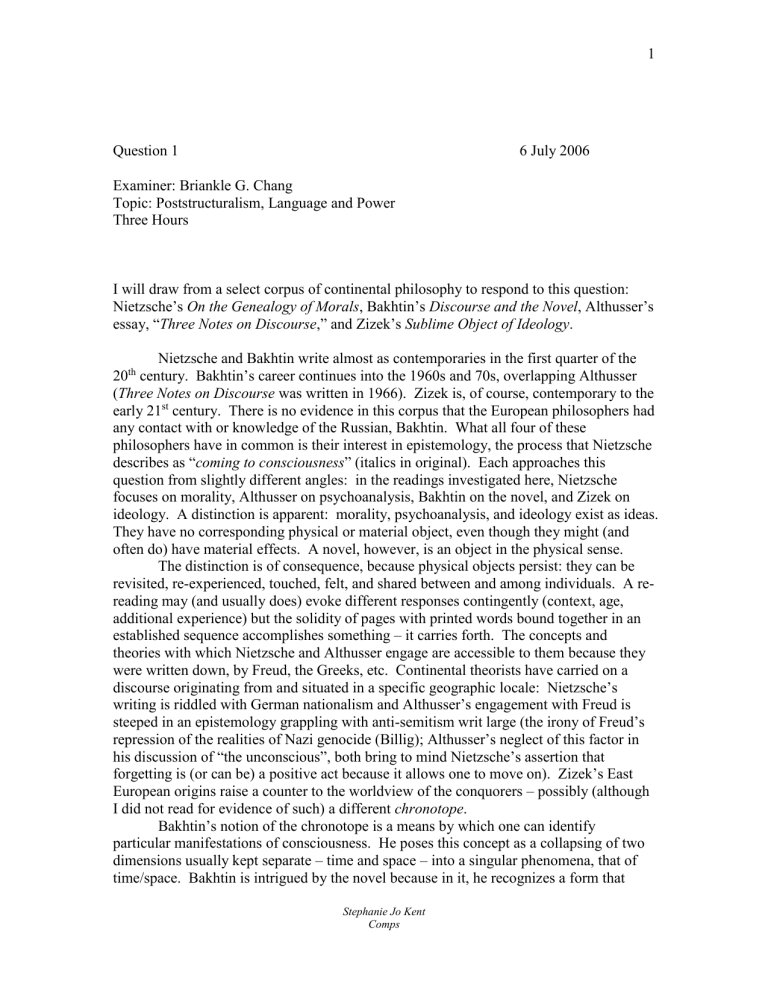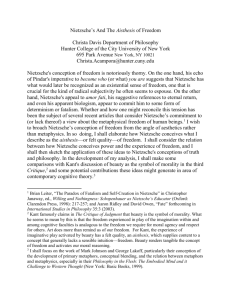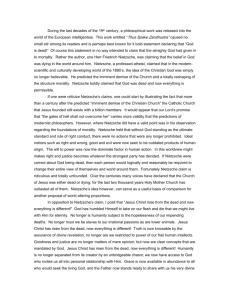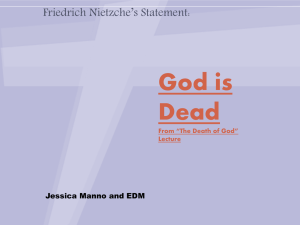I will draw from a select corpus of continental philosophy to respond

1
Question 1
Examiner: Briankle G. Chang
Topic: Poststructuralism, Language and Power
Three Hours
6 July 2006
I will draw from a select corpus of continental philosophy to respond to this question:
Nietzsche’s On the Genealogy of Morals , Bakhtin’s Discourse and the Novel , Althusser’s essay, “
Three Notes on Discourse
,” and Zizek’s
Sublime Object of Ideology .
Nietzsche and Bakhtin write almost as contemporaries in the first quarter of the
20 th
century. Bakhtin’s career continues into the 1960s and 70s, overlapping Althusser
( Three Notes on Discourse was written in 1966). Zizek is, of course, contemporary to the early 21 st
century. There is no evidence in this corpus that the European philosophers had any contact with or knowledge of the Russian, Bakhtin. What all four of these philosophers have in common is their interest in epistemology, the process that Nietzsche describes as “ coming to consciousness
” (italics in original). Each approaches this question from slightly different angles: in the readings investigated here, Nietzsche focuses on morality, Althusser on psychoanalysis, Bakhtin on the novel, and Zizek on ideology. A distinction is apparent: morality, psychoanalysis, and ideology exist as ideas.
They have no corresponding physical or material object, even though they might (and often do) have material effects. A novel, however, is an object in the physical sense.
The distinction is of consequence, because physical objects persist: they can be revisited, re-experienced, touched, felt, and shared between and among individuals. A rereading may (and usually does) evoke different responses contingently (context, age, additional experience) but the solidity of pages with printed words bound together in an established sequence accomplishes something – it carries forth. The concepts and theories with which Nietzsche and Althusser engage are accessible to them because they were written down, by Freud, the Greeks, etc. Continental theorists have carried on a discourse originating from and situated in a specific geographic locale: Nietzsche’s writing is riddled with German nationalism and Althusser’s engagement with Freud is steeped in an epistemology grappling with anti-semitism writ large (the irony of Freud’s repression of the realities of Nazi genocide (Billig); Althusser’s neglect of this factor in his discussion of “the unconscious”, both bring to mind Nietzsche’s assertion that forgetting is (or can be) a positive act because it allows one to move on). Zizek’s East
European origins raise a counter to the worldview of the conquorers – possibly (although
I did not read for evidence of such) a different chronotope .
Bakhtin’s notion of the chronotope is a means by which one can identify particular manifestations of consciousness. He poses this concept as a collapsing of two dimensions usually kept separate – time and space – into a singular phenomena, that of time/space. Bakhtin is intrigued by the novel because in it, he recognizes a form that
Stephanie Jo Kent
Comps
2 resists definition. Unlike previous forms of writing that can be categorized into poetry or epics of various types that are readily marked by certain boundaries, the novel defies conformity. In fact, the novel allows language (perhaps even language-as-such , a la
Benjamin?) to be “recorded.” This enables him to theorize the concept of heteroglossia, and provide detailed evidence of how language involves inevitable and ongoing evolutions of meaning. Bakhtin proves structural linguistics inadequate for the study of meaning-making and, by extension, the study of epistemology. He does so by detailing the constant dialogical nature of meaning-making. The most concrete operation of dialogics is the constant, unending tension between centripetal forces (that seeking to bring things into coherence) and centrifugal forces (that seek to disperse such unifications). Bakhtin unequivocally locates the center of these forces in the utterance – in what is actually said (or written).
Turning to the other three theorists, the concept of the chronotope casts a different light on their shared commitment to dialectical materialism (as opposed to dialogism).
Nietzsche’s argument is historical. The timespan encompassed by his view is vast, from the prehistory of humanity to his era (pre-Nazi). He argues (convincingly) that morality is an invention, detailing how it was invented (through an etymology of the terms ‘good,’
‘bad,’ ‘evil,’), and to what ends. Morality was initially necessary to justify grounds for punishment in order to tame certain animal instincts in the human species. This was a requirement for living in social groups. Eventually, morality became the grounds for what Nietzsche calls, “the revolt of the slaves.” What is fascinating and intriguing about
Nietzsche is how he writes as a man of his times, and yet frames his writing as a conversation to the future (i.e., as a dialogue). Nietzsche cannot break out of the backward look imposed by dialectics, yet he understands the drift of evolution. He embodies the hatred of the nobility toward the slaves, and especially the Jews, for being the first to harness the power of language. This is the inversion Nietzsche insists he detests, the transvaluation of good and bad augured in by “the priestly class”. It must be recalled that the piece, “Good and Bad, Good and Evil,” is self-described as a polemic .
Nietzsche allows the flow of anti-semitism and nationalism that were the dominant discourses of his day to appear unadulterated, even to the point of proclaiming his adherence to them. And yet, he signals certain silences, points on which he cannot or will not say more.
At the same time, Nietzsche allows that the “slaves” have won. That this new morality (promulgated through religion) has already triumphed and will continue to do so.
He even predicts the decline of the church as an institution even though its ideology will spread further and further among the masses (as it has). Nietzsche rails against the ill effects of such a doctrine, spouting all manner of prejudices against democrats and pinks, the weak, cowardly, etc ad nauseum. It is difficult to determine the extent to which
Nietzsche is unable – himself – to separate generalization from stereotype. This is a crack in the edifice of dialectical materialism. Even though Nietzsche recognizes that the vital life-source which he calls “the will-to-power” must change and take new forms to adapt to society’s changing structures, he is unable to imagine the outcome of such a shift because the basis of his knowledge is dialectical . That, or he cannot imagine a way to do that won’t align him with the priestly class – even though he marks the development of a priestly class (to counter the warrior class) as the point in time when humanity actually becomes “an interesting animal.”
Stephanie Jo Kent
Comps
3
The crack mentioned above is significant, because what Nietzsche and Bakhtin both realize, even though they come at it from such different theoretical orientations, is that the very basis of human consciousness is in transition. Nietzsche situates it historically and embodies the constraints of the past in his own writing. Would it be too much to note the incredible strain on the psyche of recognizing the dual-toned tide as the evidence of the rigid designators of one’s time ebbing and new rigid designators swelling toward their own high tide? The concept of a rigid designator is used by Zizek (who borrows it from Kripke): it is a less universal, less totalizing version of essence. In other words, the rigid designator is a move away from the power of essential/essentializing dialectics and a step toward the growing primacy of heteroglossic dialogics. Treading deep water in this shift, Althusser spins in the contradictory tides.
Three Notes on Discourse shows Althusser working hard to escape the structural limitations of linguistics in order to embrace a new (dare I say heteroglossic) languagebased theory of discourse. It is almost as if he is situated between Nietzsche’s backwardlooking dialectics and Bakhtin’s forward-looking “openended” dialogics. Althusser intuits that a Grand Theory of Discourse is on the horizon, but the requirements of dialectics are too embedded in his own psyche for him to grasp how such a theory of discourse could be operationalized. He is constrained by the requirements of dialectics to look back and follow form (e.g., proper hierarchizing of Regional Theories and Grand
Theories, rules about how RTs and GTs can be related, etc.). The sublimity of dialectics as an ideology is that it privileges the past. It is a form of knowing that presupposes the future can unfold only within the frameworks of what has been established – even though it nods to new articulations and surprises, dialectics argues that the trace of the past is always present. I do not disagree. However, by emphasizing the traces of the past, the power of language is such that it invokes those traces, re-reifying them, and therefore challenging any shift in rigid designation between signified-signifier. In other words, the insistence on looking to the past is an ideological strategy that justifies the continuation of dialectical materialism as it’s own GT.
Dialogics is thus a direct challenge to dialectics, however it is less an either-orchoice than an additional way of thinking that brings the centrifugal and centripetal forces and present-day effects of language use into view. Returning to Nietzsche’s discussion of “good,” “bad,” and “evil,” we can imagine how the centripetal forces of language use operated to cohere these definitions within and between certain classes. It is solely the power of language that raised a centrifugal challenge to the resulting rigid designations. Dialectics as an epistemology, recorded through writing, has allowed the traces of these previous formations to be identified. The danger of dialectical materialism is that it re-invokes the original conditions of the object of study, i.e, the rigid designations established at the “primal baptism”, transporting them from the past to the present. This move operates against heteroglossia, thus limiting future-looking dialogic relations. Dialogic relations recognize that not only are the present conditions differentially interpretable (e.g., usually interpreted differently), but any “original” conditions that might be invoked from the past are also differential. Heteroglossia poses the counterclaim against dialectics: there is no essence.
Language has been the material and the tool of all these philosophers. Each of them envisions a poststructuralist world, even if they don’t explain it as such. Nietzsche writes to “unknown friends.” Bakhtin focuses on the operations of language in the
Stephanie Jo Kent
Comps
4 utterance and the relationship (between speaker/hearer), which he calls “the place where language means”
, and how the utterance constantly deviates from structure. He leaves it to others to apply his notions to selected domains. Althusser tries to dig out of the morass of an already-reified “unconscious” and enacts the struggle of learning how to recognize dialectical forces without allowing them formative sway. Zizek embodies, as much as anyone now can, an iteration of the dialogical ethic. Poststructuralism from this vantage point is not nihilistic nor anti-humanist. Each of these philosophers, in their own way, point to the operations of language as the source and fuel for the evolution of the human species. This is power.
Stephanie Jo Kent
Comps









